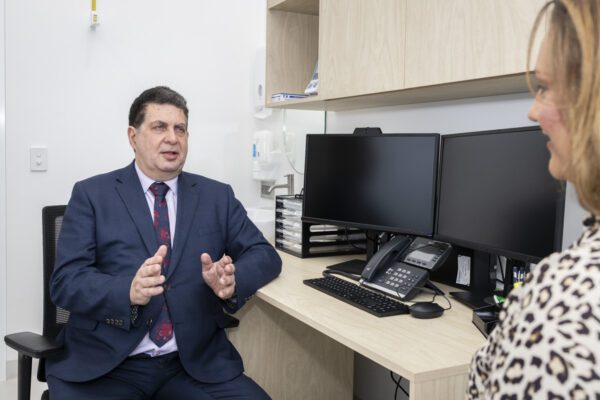Depression and anxiety are rife in Australia with one million Australian adults currently experiencing depression and two million experiencing anxiety each year. Almost half of all Australian adults will experience a mental health condition in their lifetime.
The COVID-19 pandemic has escalated rates of depression and anxiety, and related disorders, and all Australians are feeling the emotional and mental weight of the past 18 months.
“It’s no surprise, but nonetheless concerning, knowing that Australians are increasingly being impacted by severe stress and anxiety symptoms in 2021,” The Banyans Health and Wellness Clinical Director Peter Hayton says. “Mental health, without a doubt, is one of the biggest challenges for Australia in 2021.”
Mental health is one of the biggest health challenges facing Australia today.
With so many people dealing with declining mental wellness, and the levels of negative emotions running high in Australia, what should Mental Health Week mean for each of us?
 Our mental health needs to be a priority in 2021. Take time to check in on yourself.
Our mental health needs to be a priority in 2021. Take time to check in on yourself.
What is mental health?
Mental health is our state of mind and our ability to cope with the everyday things that are going on around us.
Poor mental health is different for everyone and can take many forms, often simultaneously. Depression, anxiety, Post Traumatic Stress Disorder (PTSD), eating disorders and disordered eating, substance use disorder, addiction, Obsessive Compulsive Disorder (OCD), bipolar disorder, and trauma, can often occur in comorbidity.
“Not everyone’s mental health is at crisis point,” says Peter, “and it’s important to get help before concerns around mental health begin to negatively impact your life and those you love.”
See your GP now if you have concerns or questions about your mental health or that of someone you love, and they may be able to work with you regarding a mental health care plan.
Related: COVID stress syndrome is real
Too time-poor to look after yourself
Many of us feel there are not enough hours in the day to get everything done. Busyness is now glorified.
Important life issues are overwhelming, with people trying to juggle work commitments, working from home, ageing parents, family commitments, partners, businesses, unemployment or underemployment, home finances, home schooling, drinking enough water, exercising regularly and eating healthily.

Are there signs that your life could be ‘too busy’?
Is there time in the day to Take Time for Mental Health?
Perhaps we need to start looking at it another way.
Do you have time to ignore your mental health and allow it to decline?
Looking after your mental health and checking in on yourself is an investment in your future, in the same way as scheduling bills to be paid saves time in the future, or how investing in superannuation builds your nest egg.
Looking after your mental health today saves time, effort, money, and your relationships in the long run.
General Practitioner Dr Tamara Weerasinghe from The Banyans Medical Centre is open about the fact that she takes a week off two or three times a year to prioritise her mental wellbeing. She goes away by herself without her partner and two teenage children because she understands that she needs regular “alone time” in order to be present for her family for the rest of the time.
“It’s kind of filling yourself back up because there’s so much in life that takes out of us – children, marriage, work – so it’s really important to take those moments and also just talking to your family, your partner, whoever, to say this will actually help all of us,” Dr Weerasinghe says.
“If you don’t care for yourself, you can’t actually care for others – that’s what it comes down to, and I say that to all of my patients.”
Ten ways to check in on yourself this Mental Health Week
- Are you male or female? Many mental health conditions are specific to an individual’s gender at birth. Women experience depression, anxiety and post-traumatic stress at higher rates than men.
- How old are you? Younger people have been more impacted with depression and anxiety disorders are a result of the COVID-19 pandemic.
- How much stress are you dealing with? Have you experienced any of the following major life stressors:
- death of a family member or friend
- serious illness or disability
- unemployment or underemployment
- an alcohol- or drug-related problem
- a recent separation or breakdown of a relationship
- English is your second language, or you come from a different culture
- members of your family are in jail
- you have been a witness to or a victim of violence
- trouble with the police or law
- discrimination or racism
- overcrowding at home.
Related: The five stages of PTSD
- Have you had changes to your emotions and feelings recently? Have those changes impacted your life by:
- severely preventing or stopping you doing the things you usually do
- restricting the things you would usually do
- affecting your general wellbeing, and how you feel day to day
- Have you been feeling any of the following?
- Suicidal – Help is available, speak with someone today. Call Lifeline 24 hours on 13 11 14
- Anxious
- Stressed
- Low moods
- Depression
- Have you or a loved one increased alcohol intake? Read more about Identifying alcoholism in a loved one.
- Have you increased your drug taking, or started taking drugs? Australia has the highest per capita rate of cocaine use in the world, and it’s Watch Australia’s Cocaine Crisis.
- Are you neglecting your personal needs such as hygiene, sleep, exercise or skipping meals?
- Have you had a change in motivation?
- Are you finding an inability to find joy or pleasure in things that you usually enjoy?
Are you overwhelmed? Check in on yourself and your mental health
If you relate to any of the above when you checked in with yourself this week, then please contact your GP to discuss your mental health.
It’s important to remember that feeling depressed or anxious does not necessarily mean you have an anxiety disorder or depression, but you do need to see a medical professional for further assessment, which may include a mental health care plan.
Good news for your mental health
According to Australia’s government website healthdirect.gov.au, you probably have good mental health if:
- you are confident when faced with new situations or people
- you feel optimistic
- you do not always blame yourself
- you set goals
- you feel good about yourself
- you have good self esteem
When you look after your own wellbeing, you are able to provide support for your family, friends, and neighbours, and your communities, workmates and employees are uplifted too.

You need to look after yourself before you can look after others.
Talk to someone
The first step towards getting help for your mental health is knowing that you don’t need to tackle this alone.
Talk to someone – either a friend or family member – and visit your GP.
Living with poor mental health is difficult and each person’s experience is different. Taking positive steps to improve your mental health can be hard, but it will be worth it.
The Banyans Health and Wellness has helped hundreds of people discover their best options for mental health services, programs, and treatment of depression, anxiety, eating disorders, PTSD and other mental health challenges.
The Banyans Health and Wellness helps people progress to live a happy and fulfilled live.
The Banyans Health and Wellness is available 24/7 to help you begin your journey towards a life good mental health. You can call anytime on +61 1300 226 926 or submit an online enquiry to begin learning how we can help you rediscover the fullness of life.






